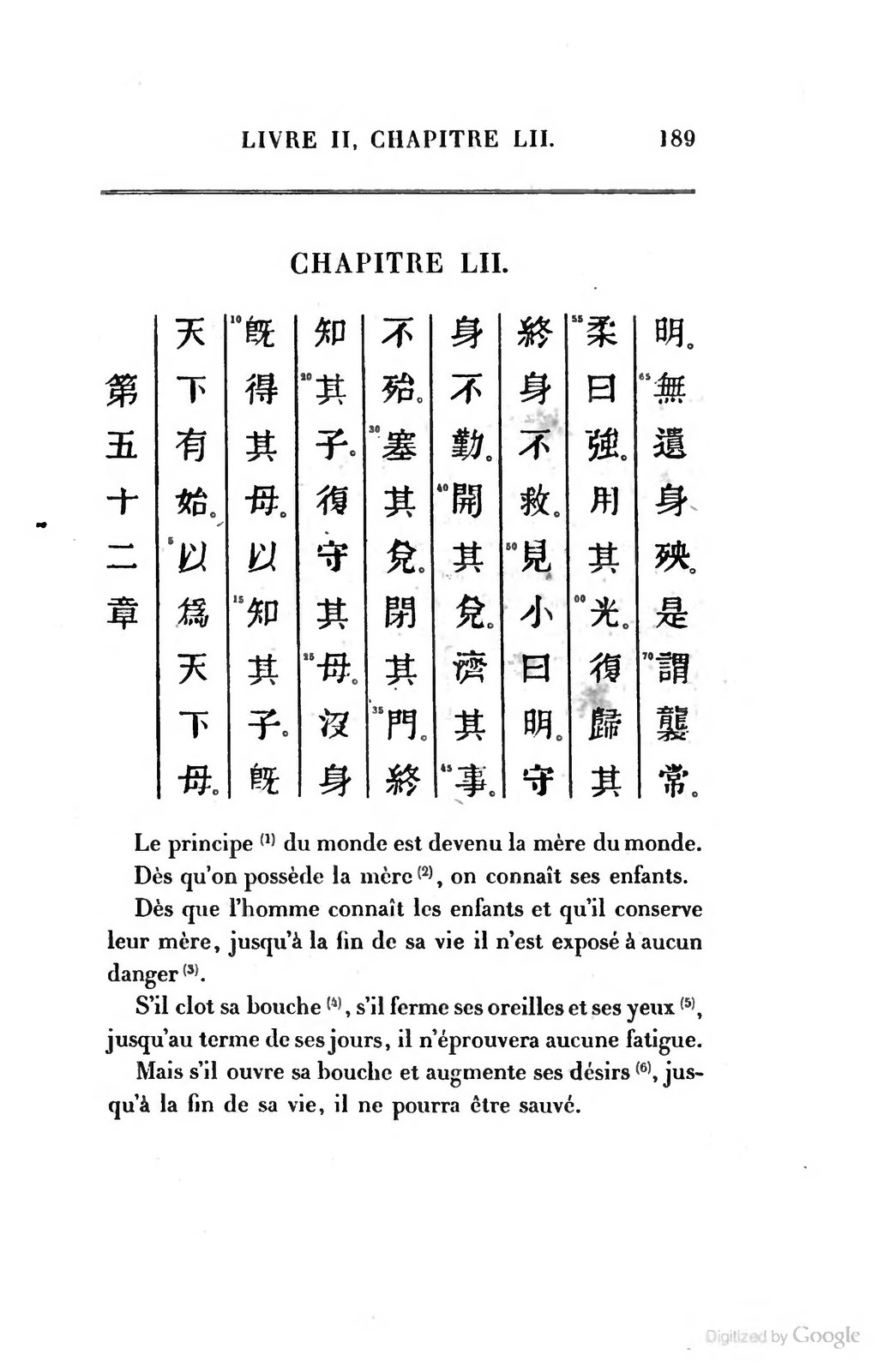
| 52 | 道德經: | 既得1其母,以2知其子,既知其子,復守其母,沒身3不殆。 塞其兌,閉其門,終身不勤。 開其兌,濟其事,終身不救。 見小曰明,守柔曰強。用其光,復歸其明,無遺身殃;是為習常。  |
| Dao De Jing: |
(Returning to the source)
(The Dao) which originated all under the sky is to be considered as the mother of them all.
When the mother is found, we know what her children should be. When one knows that he is his mother's child, and proceeds to guard (the qualities of) the mother that belong to him, to the end of his life he will be free from all peril.
Let him keep his mouth closed, and shut up the portals (of his nostrils), and all his life he will be exempt from laborious exertion. Let him keep his mouth open, and (spend his breath) in the promotion of his affairs and all his life there will be no safety for him.
The perception of what is small is (the secret of clear-sightedness; the guarding of what is soft and tender is (the secret of) strength.
Who uses well his light,
Reverting to its (source so) bright,
Will from his body ward all blight,
And hides the unchanging from men's sight.
3. 身: Originally read: "其". 據《古逸叢書》本、馬王堆本改。
[注釋]
1、始:本始,此處指「道」。
2、母:根源,此處指「道」。
3、子:派生物,指由「母」所產生的萬物。
4、塞其兌,閉其門:兌,指口,引伸為孔穴;門,指門徑。此句意為:塞住嗜欲的孔穴,閉上慾念的門徑。
5、勤:勞作。
6、開其兌,濟其事:打開嗜欲的孔穴,增加紛雜的事件。
7、見小曰明:小,細微。能察見細微,才叫做「明」
8、強:強健,自強不息。
9、用其光,復歸其明:光向外照射,明向內透亮。發光體本身為「明」,照向外物為光。
10、無遺身殃:不給自己帶來麻煩和災禍。
11、襲常:襲承常道。
[引語]
本章是繼四十七章後再次論述哲學上的認識論問題。老子認為,天下自然萬物的生長和發展有一個總的根源,人應該從萬物中去追索這個總根源,把握原則。人們認識天下萬物但不能離開總根源,不要向外奔逐,否則將會離失自我。在認識活動中,要除去私慾與妄見的蔽障,以真正把握事物的本質及規律。
|
Dao De Jing Chapter 52 - Seddon
Jan 3 at 5:26 AM
52
All things under Heaven have the same source;
This may be called the Mother of the Ten Thousand Things.
Knowing the mother,
One may know the children.
Knowing the children,
One may keep to the mother,
And to the end of one's days, never meet with danger.
Whosoever closes the mouth
And shuts the doors
Will be free from trouble throughout his life.
But whosoever opens the mouth
And adds to his affairs,
To the end of his days, will be beyond hope.
To see the small is to be enlightened.
To keep to the weak is to be strong.
Use the light of your intellect,
But return to enlightenment,
And thus avoid misfortune.
This is called practising the constant.
天下有始、以为天下母。既知其母、复知其子。既知其子、复守其母。没身不殆。塞其兑、闭其门、终身不勤。开其兑、济其事、终身不救。见小曰明。守柔曰强。用其光、复归其明。无遗身殃。是谓袭常。
【注】此言道体之方,当以背物合道为要妙也。由万物皆资始乎道。故曰天下有始,以为天下母。所谓道生之也。是知道为体,而物为用。故道为母,物为子。人若但知道体虚无,而不知物从此生,是知母而不知子,则沦于断灭。若但知物而不知道,是殉物而忘道,则失其性真。所以既知其母,亦复要知其子,所谓有体有用也。既知物从道生,则不事于物。故曰既知其子,复守其母。所谓用不离体也。体用两全,动静不二,故没身不殆。殆,危也,又尽也。下示守母之方。兑为口,门乃眼耳,为视听之根。谓道本无言,言生理丧。妄机鼓动,说说而不休,去道转远。唯是必缄默以自守,所谓多言数穷不如守中。故日塞其兑。然道之于物,耳得之而为声,目得之而为色。若驰声色而忘返,则逐物而背性。是必收视返听,内照独朗。故曰闭其门。如此,则终身用之而不勤矣。勤,劳也。若徒执言说以为得。以资耳目之欲,火驰而不返。则是开兑济事,丧心于物,则终身不可救矣。是皆不能戒谨于隐微之间,而忽于欲机之兆,非为明也。孔子曰,知机其神乎。故曰见小曰明。以道自胜,故曰守柔曰强。是故学人当用其光,复其明,则无遗身殃也。然光,道之用也。明,道之体也。用不离体,故用愈光,而体愈明。此所以能无遗其殃也。袭,承也。且真常之道,吾固有之。但凡人不能承袭而自绝耳。苟能如此做工夫,则绵绵而不绝矣。故曰是谓袭常。
No comments:
Post a Comment